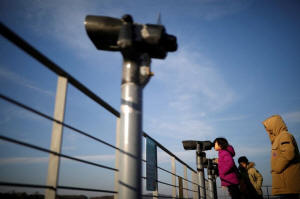|
North Korea reopens border hotline as
Trump boasts of 'bigger' nuclear button
 Send a link to a friend
Send a link to a friend
 [January 03, 2018]
By Christine Kim [January 03, 2018]
By Christine Kim
SEOUL (Reuters) - North Korea reopened a
long-closed border hotline with South Korea on Wednesday, hours after
U.S. President Donald Trump appeared to mock the North's leader by
saying he has a "bigger and more powerful" nuclear button than he does.
The North's decision to open the border phone line came a day after
South Korea proposed high-level discussions amid a tense standoff over
North Korea's missile and nuclear programs.
That followed North Korean leader Kim Jong Un's New Year address in
which he said he was open to speaking with the South and would consider
sending a delegation to the Winter Olympics to be held just across the
border in Pyeongchang in February.
U.S. officials said Washington would not take any talks between North
and South Korea seriously if they did not contribute to denuclearizing
North Korea. A State Department spokeswoman said North Korea "might be
trying to drive a wedge of some sort".

Kim ordered the reopening of the hotline at the truce village of
Panmunjom at 0630 GMT on Wednesday, when South Korean officials at the
border received a call from the North, the South's unification ministry
said in a text message.
Officials on both sides were checking the line and conducting a
conversation for about 20 minutes, the contents of which were not
disclosed by the ministry.
That gesture came only hours after Trump, who has mocked Kim as "Little
Rocket Man", again ridiculed the North Korean leader on Twitter.
"Will someone from his depleted and food starved regime please inform
him that I too have a Nuclear Button, but it is a much bigger & more
powerful one than his, and my Button works!" Trump tweeted.
Trump and Kim have exchanged a series of bellicose comments in recent
months, raising alarm across the world, with Trump at times dismissing
the prospect of a diplomatic solution to a crisis in which North Korea
has threatened to destroy the United States.
While appearing to open the door to discussing taking part in the Winter
Olympics, Kim also warned that he would push ahead with "mass producing"
nuclear warheads in defiance of U.N. sanctions.
His New Year's Day speech came after a steep increase in missile
launches in 2017, as well as the North's sixth and most powerful nuclear
test. Kim, who has vowed to develop a nuclear-tipped missile capable of
reaching the United States, said he had a nuclear button on his desk.

[to top of second column]
|

A girl looks toward the North through a pair of binoculars near the
demilitarized zone separating the two Koreas in Paju, South Korea,
January 3, 2018. REUTERS/Kim Hong-Ji

'SERIOUS AND SINCERE'
The hotline with the South was shut down by North Korea in February 2016
in retaliation against the closing of a border factory town that was
jointly operated by the two Koreas.
"We will try to keep close communications with the south Korean side
from sincere stand(sic) and honest attitude, true to the intention of
our supreme leadership, and deal with the practical matters related to
the dispatch of our delegation," the North's KCNA news agency quoted Ri
Son Gwon, chairman of North Korea's Committee for the Peaceful
Reunification of the Fatherland, as saying.
The talks would aim to establish formal dialogue about sending a North
Korean delegation to the Olympics, Ri said.
South Korean presidential spokesman Yoon Young-chan said the North's
decision to open the hotline had "significant meaning" because it could
lead to constant communication.
U.S. officials had voiced scepticism about the possibility of meaningful
talks, particularly if they did not take steps towards banning North
Korea's nuclear weapons.
Nikki Haley, the U.S. ambassador to the United Nations, warned North
Korea against staging another missile test and said Washington was
hearing reports that Pyongyang might be preparing to fire another
missile.

Chinese Foreign Ministry spokesman Geng Shuang said both sides should
seize the Olympics as an opportunity to improve ties and make concrete
efforts toward alleviating tension.
"All relevant sides should grab hold of this positive trend in the
Korean peninsula and move in the same direction," Geng told a daily news
briefing in Beijing.
North Korea regularly threatens to destroy South Korea, the United
States and Japan, and says its weapons are necessary to counter U.S.
aggression. The United States stations 28,500 troops in the South, a
legacy of the 1950-53 Korean War.
(Additional reporting by Joyce Lee in Seoul, and Philip Wen in Beijing;
Editing by Paul Tait and Nick Macfie)
[© 2018 Thomson Reuters. All rights
reserved.]
Copyright 2018 Reuters. All rights reserved. This material may not be published,
broadcast, rewritten or redistributed. |